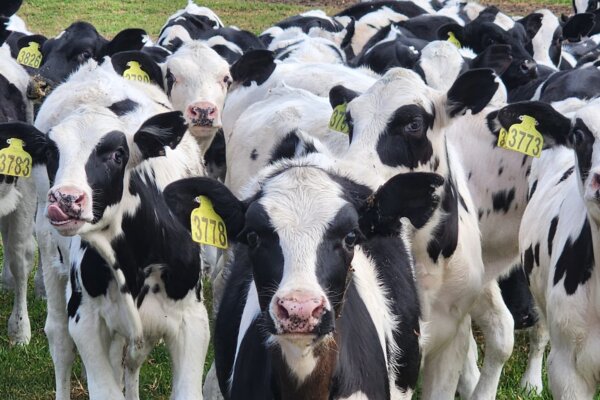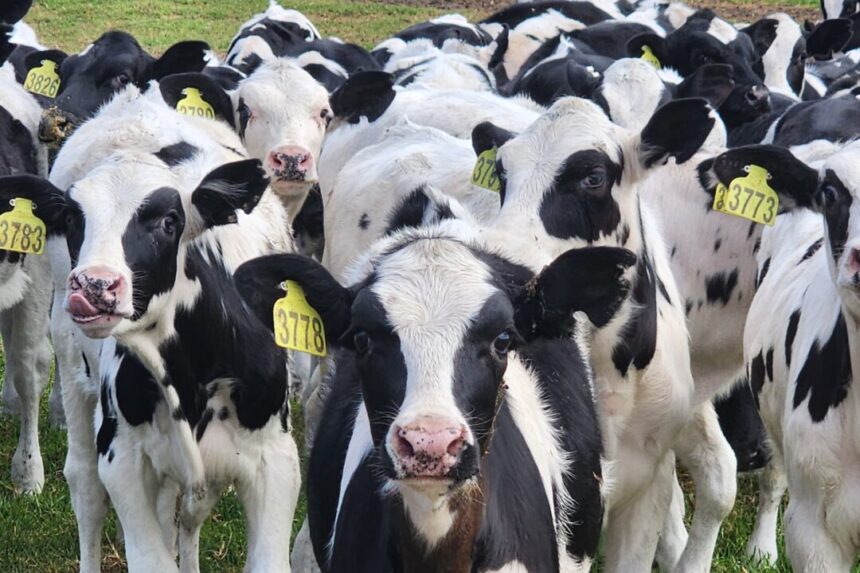
There is a growing trend among dairy farmers to avoid using a new gas inhibiter designed to reduce emissions from cattle.
Several Australian dairy companies have decided not to use the cattle feed additive Bovaer, which claims to reduce cattle methane emissions by 50 percent or more.
Norco Milk, Maleny Dairies, Gippsland Jersey, and Bass River Dairies have joined other businesses in stating that their cows are not fed the powder, following backlash online against supermarket giant Coles for using the product.
Bovaer, developed by Dutch global health and nutrition company DSM-Firmenich, breaks down in the cow’s digestive system before decomposing into naturally occurring compounds in the cow’s stomach. It controls the amount of gas released by the animals by suppressing the enzyme that triggers methane production.
The supplement is fed to cows at a rate of one gram per 20 kilograms of feed.
The additive, developed over 10 years, consists of silicon dioxide, propylene glycol, and the organic compound 3-nitrooxypropanol.
In an official statement on Dec. 3, Norco Milk confirmed that their farmers do not use the additive.
“At Norco, we pride ourselves on producing high-quality, natural dairy products,” the statement said.
“Product quality and safety are of utmost importance to our 100 percent farmer-owned cooperative.
“We can assure our customers that all Norco products are safe to consume, and they can continue to purchase Norco dairy products with confidence.”
Maleny Dairies farmer and eastAUSmilk President Joe Bradley stated that none of their farmers were using Bovaer.
Bass River Dairies took a more light-hearted approach, labeling their product as “full fart milk.”
Gippsland Jersey mentioned that consumers were just starting to become aware of the addition of Bovaer in cattle feed.
“At Gippsland Jersey, we take pride in producing Australia’s finest real milk—pure, natural, and free from any additives,” the company’s statement read.
Additive Not New
Despite recent discussions about the use of Bovaer in cattle diets, the additive has been employed in Australia for several years.
Bovaer was approved by the Australian Pesticides and Veterinary Medicines Authority for livestock use in September 2021.
Its producers claim that it can reduce CO2 equivalent emissions by one ton per cow per year.
In November 2023, Coles announced that it was expanding the use of Bovaer after successful trials showed a reduction in methane emissions in beef cattle.
Coles reported that there was no difference in the meat obtained from cattle fed Bovaer.
“We look forward to expanding the use of this innovative supplement to more of our Coles Finest certified carbon-neutral beef suppliers and continuing the important research to support the beef industry’s goal of carbon neutrality by 2030, as well as Coles’ sustainability objectives,” said Coles Livestock Sustainability and Innovation Manager Maria Crawford.
Farmer Warns of ‘Chemical Cocktails’ in Non-Organic Meat and Dairy
Farmer Nick Holliday raises beef and pork cattle on his property in Queensland.
The producer, who raises meat without chemicals, stated that he does not use Bovaer but cautioned consumers against focusing solely on the additive while ignoring the numerous chemicals present in meat and dairy cattle.
“Feedlot cattle, industrial beef, and dairy in Australia, these animals are already chemical cocktails,” he mentioned in a social media video.
“You might be surprised to learn about the multiple vaccinations they receive.
“You might be surprised to learn about hormone growth implants that nearly all feedlot cattle receive.”
Holliday noted that nearly all cattle are tagged with Diazinon, an insecticide that was banned in Australia after it had already been prohibited overseas.
“You’d be surprised to hear about Ivermectin and Cyfectin, pour-on and injectable insecticides for ticks and stomach parasites,” he added.
“You’d be surprised to hear that they graze on pastures treated with herbicides like Round-Up and Paraquat, which have been linked to causing Parkinson’s Disease in individuals who handle them.”
“While it’s important to be concerned about Bovaer, it’s essential to consider the broader picture as well,” he concluded.
The Australian Dairy Association was reached out to for comment.





